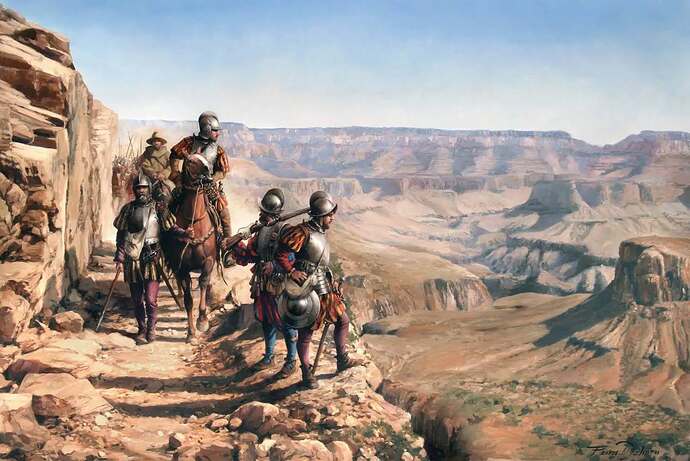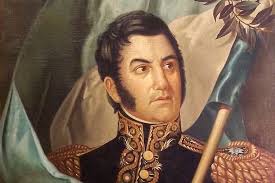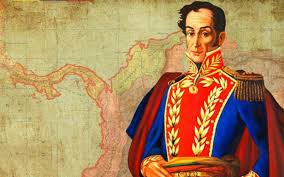During the last Vidchat, Dr. Farrell observations about binary history got me thinking deeply. A lot of historians can’t do an adequate interpretation of what was the story of a political society and community, that was so complex and with so many edges as the Spanish Empire.
The Spanish Empire let’s say from 1500 - 1800 has been partly forgotten when it comes to write the development of Europe and Western predominance over the planet. I submit, this is due to a fundamental reason; historians have viewed things using capitalist parameters as a way to explain all European societies, all economic systems, all political phenomena. From the Renaissance all the way to the 20th century, historians always viewed things from a capitalist perspective to be able to explain everything.
Of course, when we stumble with the discovery of the Americas —I prefer Las Indias sounds more mysterious and romantic— we immediately stumble with a reality and that is the system of financial industrial capitalism, that help us explain the colonialism and the great global empires of the 19th and 20th century; is a parameter that doesn’t serve us completely, to be able to explain the conquest of the Americas. Why? Because one thing is a society during the Renaissance and another a capitalist society in the 19th and 20th century.
There has been stabs at this with mixed results. For example, The Annales School of History with Fernand Braudel. There are Marxist theories of history but those have not concentrated in the study of Spanish Empire. There is a whole generation of foreign historians, that specialized in the study of Spain in the 50’s, 60’s, 70’s. People like Stanley G. Payne, Henry Kamen, John Elliot, Joseph Pérez, etc. There are a lot of people that criticize them for a variety of reasons. They are an example that the Marxist parameters of historical materialism have not been applied when studying the Spanish Empire. That doesn’t mean their history of the Spanish Empire is bad, John Elliot, Stanely Payne, have done their stabs about the topic.
Dr. Juan Bautista Fuentes Ortega, a professor at the Complutense University of Madrid. He argues that what Spain constructed in America, and other places in the world, it’s not a feudal society, nor a capitalist society, but a kind of alternative modernity, that was build during the Spanish golden age. An alternative modernity that was defeated by the existing modernity of capitalism.
So the question is, did Spain brought to the Americas a feudal or capitalist system, or is really an alternative modernity that was different from the one that triumphed? I think the answer is not in binary history. Personally, I agree in part with Dr. Fuentes Ortega. Spanish society — or Hispanic American, or Amerindian— the Spanish/Indian society that was formed in the Americas was extraordinarily complex. Not only because the extension of the territory — that goes from Buenos Aires to California— but because in the Americas there was a lot of different Indigenous communities. Not only were they absorbed by the Spanish Monarchy, in many cases they were left intact. One example that I like very much is the Inca aristocracy. They continued governing and applying their class order inside the Spanish Empire. In other words, the Inca aristocracy was not overthrown by the Spaniards, but continued exercising power inside the Viceroyalty of Peru. In the case of Mexico it was different because the Aztec empire and society was dissolved completely by Hernán Cortés.
Was there an alternative modernity to Feudalism and Capitalism? I would say only in part for one reason, Renaissance Spain is a society that is already imbued in mercantilism. So was the Spanish Empire disconnected completely from industrial modern capitalism? Yes absolutely, but careful, mercantilism was well established in Castile and they had important commercial companies with the Netherlands and England before the conflicts with the Protestants. In regards to feudalism, it also depends on the region, because, if we are talking about the Viceroyalty of Peru, there is proof that there were some Inca elites, who continued exercising a certain type of feudalism that was practiced before the arrival of the Spaniards.
The Spanish Empire is a very complex reality, because is an enormous land mass and the provinces were diverse. The Spanish Monarchy had to adapt their strategies of evangelization and relationships with those communities given the great diversity. The governance was not the same, say in Texas, Colombia or Peru. I do think the Spanish Empire was an alternative modernity but the microscope has to be adjusted on the different Vice royalties and provinces.
Why I wrote this? What is bugging Mr. Kenny? In the last Vidchat Dr. Farrell was spot on, we have a binary way of looking at history and there is no nuance. I submit that The United States of America has two Mother Countries Spain and Britain. The US exists because Spain — all of it— said so. The Revolutionary army was funded with silver from the Viceroyalty of New Spain, Peru, and coined in Cuba. The country was recognized as a nation by Spain, before Washington won any decisive battles.The name The United States was given by the governor of Cuba.
The Black Legend of the Spanish Empire is as bad as knocking down statues of Jefferson Davis. When the US promotes the Black Legend they are destroying their own history. For example, does anyone in America knows that San Juan remained loyal to the Spanish Empire to the bitter end? That just like we are loyal to America now, we were loyal to Spain. There should be no shame with this, and yet we get the Spanish bad and Mesoamerica was a primordial paradise version of history.



